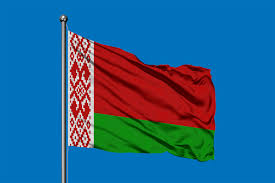 https://twitter.com/home https://www.facebook.com/Shabbir.Hussain191
https://twitter.com/home https://www.facebook.com/Shabbir.Hussain191By Shabbir Hussain
ISLAMABAD, Oct 26 (Alliance News): Chargé d’affaires of the Republic of Belarus Pavel Evseenko in a letter to the United Nations Secretary-General warned the world about the negative impact on global food security, if sanctions against Belarusian potash fertilizers.
The Republic of Belarus has repeatedly raised the issue that sanctions against Belarusian potash fertilizers, including Lithuania’s illegal ban on the transit of Belarusian potash, threaten to cause world hunger and endanger global food se curity.
Aides-mémoires from Belarus on this matter have been issued as official documents
of the United Nations General Assembly.
However, Lithuania continues to claim that Belarus’ contribution to global food
security is supposedly insignificant, despite Belarus having a 20 per cent share in the
global trade in potash fertilizers up until 2022.
The shortage of potash fertilizers as a result of the restrictive measures imposed
against Belarusian potash has led to a shortage of potash fertilizers on the world
markets and to an increase in their price and, consequently, a reduction in t heir use,
lower crop yields and higher food prices.
The situation is particularly dangerous in the least developed countries of the world, with the potential for widespread hunger. I have the honor to convey herewith an information note highlighting the negative impact of sanctions with regard to Belarusian potash fertilizers on global food security.
Pavel Evseenko said ” I would appreciate it if you could have the present letter and its annex circulated as a document of the General Assembly under agenda item 24.”
The steps taken by Western countries with regard to Belarusian potash fertilizers are a source of serious concern for Belarus. The illegal ban on the transit of fertilizers has dire implications for global food security and the elimination of hunger.
For millions of people around the world, food insecurity and hunger become more likely and more severe as fertilizer shortages continue.
Half the world’s population gets food as a result of fertilizers, and removing fertilizers from the field will significantly reduce the yield of crops – for some crops the yield will drop by as much as 50 per cent.
JSC Belaruskali is the world’s second largest producer of potash. Before the illegal termination of Belarusian potassium transit through the ports of the Baltic Sea (violating, among other things, the landlocked country’s right to access to the sea), the share of Belarus in global potash trade amounted to about 20 per cent.
However, owing to illegal bans and sanctions, imposed on Belarusian potash and its only producer JSC Belaruskali by the United States, the European Union and some European Union members in violation of several international multilateral and bilateral treaties, the share of JSC Belaruskali product in global production and export had dropped to 10 per cent by the end of the first half of 2022.
This decrease in the production and export of Belarusian potash fertilizers has led to a 16.3 per cent drop in the global output of potash fertilizers, or 5.9 million tons, and a 20.2 per cent drop in global exports, or 5.8 million tons, compared with the same period in 2021.
The illegal and often absurd actions of our neighbors, especially Lithuania and Poland, threaten the food security of not just individual countries, but entire regions and continents.
Africa is an example. The share of Belarus in the African potash markets decreased in 2022 from 41.7% to 2.8%. According to our estimates based on FAO data, the almost complete disappearance of Belarus from the list of potassium suppliers in 2022 led to a drop in the grain harvest in Africa by 16.1%. In 2023, our supplies to Africa are completely paralyzed due to Lithuania’s actions.
Despite some drop in potash prices in 2023, prices will remain significantly higher than in 2021. (According to the World Bank forecast, in 2023, the average world price of potash fertilizers will roll back to $475 per ton, and to $425 in 2024. Global potash prices as of January 1, 2022 were $221 per ton.)
Meanwhile, the demand for potash continues to grow as the world’s population grows. Owing to the life cycle of potash ore production, possible increase in potash capacity is at best possible in Canada, and not before 2025. Therefore, although Canada remains the largest potash producer, neither Canada nor any other country will be able to compensate in 2023 or 2024 for the volume of Belarusian potash withdrawn from the market as a result of restrictive measures.
Reports by authoritative international organizations and agencies (UN, FAO, WTO, World Bank, International Fertilizer Association) confirmed conclusions of Belarus that the shortage of potash fertilizers in the world markets contributes to reduction in their use, lower yields, and higher prices for food.
Furthermore, as global food security deteriorates and potash shortages develop in the global market, other global suppliers are taking advantage of the situation to raise potash prices and generate additional profits. An increase in fertilizer prices, however, means higher costs for farmers and a reduction in yields, as well as an even greater rise in food prices.
In view of the real risk to global food security, the Belarussian side appeals for assistance in the matter of exempting Belarussian potash from voluntaristic bans and restrictions and restoring the unhindered transit of Belarusian fertilizers to the global market, including Latin America, Asia and Africa. Lithuania must return to fulfilling its international obligations, which it assumed voluntarily.
In view of the matter of global food security, the Belarusian side is also ready to provide its territory without any precondition for the transit of Ukrainian grain to the Baltic Sea ports.
Belarus proceeds from the approach that the interest of ensuring global food security will become a priority for all global actors.


